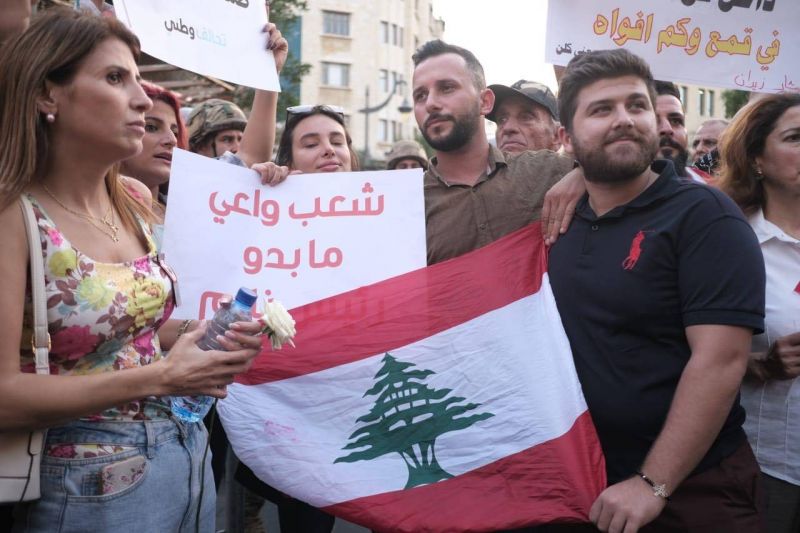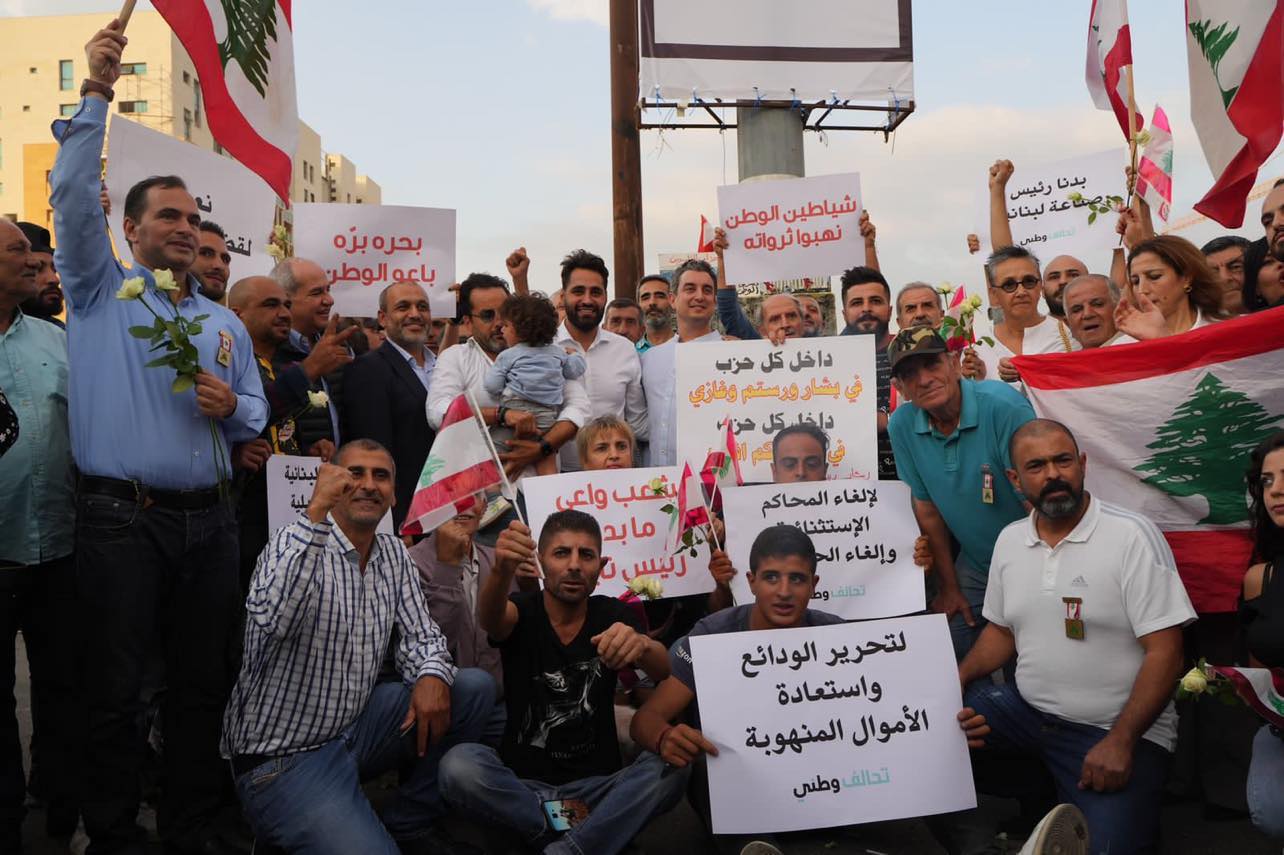
Protesters gathered in Downtown Beirut on Oct. 17, 2022 to mark the third anniversary of the uprisings. (Credit: João Sousa/L'Orient Today)
A "disappointment" was felt on Monday among protesters on the third anniversary of the Oct. 17, 2019 uprising movement in Lebanon. Only a few dozen people gathered in Martyrs' Square in downtown Beirut to commemorate the thawra, or revolution in Arabic.
Low turnout
Unlike in previous years, there was a low number of security officials and army soldiers compared to other protests. A few police and soldiers were deployed at the time of the protest in the heart of the capital which was devastated on Aug. 4, 2020 by the Beirut port explosion. During last year's commemoration, the protest also received a low turnout.
During Monday's protest, a group of protesters installed the well-known emblem of the uprising, a symbolic fist of the revolution, made of fabric, on a metal scaffolding.
Protesters gathered in Downtown Beirut on Oct. 17, 2022 to mark the third anniversary of the uprisings. (Credit: João Sousa/L'Orient Today)(Credit: Joao Sousa/L'Orient Today)
Revolutionary chants sounded at the demonstration. Slogans against the maritime border agreement with Israel were shown on some banners, amid recent news on Thursday from Lebanese President Michel Aoun, who had announced Lebanon's approval of the final version of the maritime agreement with Israel, the result of a long negotiation process under the mediation of the US.
Forces of Change MP Najat Aoun Saliba, along with several other elected officials from her parliamentary group, was present among the demonstrators.
"I think there are very few people because of the economic crisis. Politics is not only played in the street, but also in the institutions and in the Parliament," Saliba said. "It would be great if the street could put pressure on the presidential election to be held because we don't want a power vacuum," she added.
 Forces of Change MPs stand among demonstrators during the third anniversary of the Oct.17 nationwide protests. (Credit: Mohammad Yassin/L'Orient Today)
Forces of Change MPs stand among demonstrators during the third anniversary of the Oct.17 nationwide protests. (Credit: Mohammad Yassin/L'Orient Today)
For Forces of Change MP Mark Daou, also present during the protest, "The uprising can't die."
On the subject of the presidential election, he said that "The population should feel concerned" and that "It is important to mobilize," while the mandate of the current head of state, Michel Aoun, is set to expire on Oct. 31.
Lebanese parliamentarians now have only two weeks to elect a successor for the head of state. During the first election session on Sept. 29, MPs failed to elect a new president due to the lack of consensus between the different political parties. A second session, held last week, was adjourned to Thursday due to a lack of quorum.
The collectives from the protest movement have announced a second protest scheduled for this Thursday, in parallel with the third session of Parliament devoted to the presidential election.
'Disappointment'
Another demonstrator, Mohamad, a 17-year-old resident of Beirut, seems disappointed at the low turnout.
"Three years ago, on the first day, we were all together in the street. Since then, people have turned to their zaims (leaders), to sectarianism," he said. "It's really sad when you remember the first days," he added.
On Oct. 17, 2019, unprecedented protests broke out in Lebanon, denouncing the ruling political class. Rallies across the country continued for several months, before fizzling out.
Maggie Nenedjian, 39, a journalist and humanitarian with the NGO Dafa, headed by MP Paula Yacoubian, who is one of the 13 MPs who emerged from the popular protest, said: "We have 13 MPs who represent us, I hope we will have more in the next elections. The thawra is not dead. We do not need to be in the street to be rebels, we can rebel within society itself." Regarding the election of a new president, Maggie Nenedjian hoped that the new president "will be a reflection of his people."
Also present in Martyrs' Square was 48-year-old demonstrator Tarek Charaf, who said that "The October 17 movement has not come to an end. It is a long-term struggle. The Lebanese people must change their mindset. They need to understand what a good governance policy is, transparency ... and remember that politicians are civil servants serving the people."
Sali Hafez, who held up a Blom Bank branch in Ashrafieh last month, armed with a toy gun, also took part in the rally. She had said her action against her bank was to obtain her own funds for her sister, Nancy, who is reportedly suffering from cancer. Lebanese banks had been targeted during the Oct. 17, 2019 protests after imposing illegal capital controls on the deposits of most Lebanese while allegedly allowing billions of dollars to be transferred abroad for very few accounts, including those of high-ranking politicians.
Sali Hafez during Monday's demonstration in Beirut. (Credit: João Sousa/L'Orient Today)
Around 5:30 pm, the demonstrators observed a minute of silence in memory of the "martyrs of Oct. 17." At around 6 p.m., they moved towards the Parliament, located near Nejmeh Square, where a spokesperson read a statement on behalf of the groups organizing the demonstration. The protesters then dispersed, without any clashes being reported.